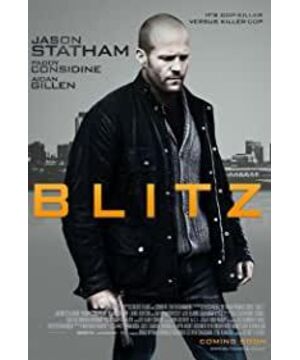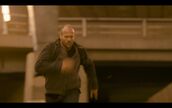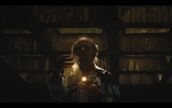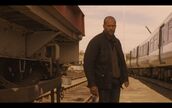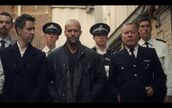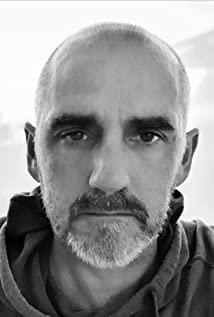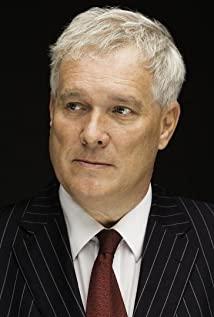Her words are the core content of the film.
From the appearance of the opening film company on the screen to the ending song, I have countless urges to leave the theater.
"This is terrible, it's the worst film I've ever watched. It's so terrible, it can still be made into a movie, and China Film still has to spend some effort to import it." I said to BF.
In the sensational and harsh heavy metal rock soundtrack, the film full of violence, blood and swearing lasted for an hour and a half.
The film tells the story of a group of policemen arresting a neurotic homicide. The police knew from the beginning that it was this neurotic, and it took a lot of setbacks to catch him, but there was no evidence to bring him to justice. In the end, the police pretended to be a gangster, beat the neurotic gangster on a rooftop, and then collapsed the neurotic policeman.
"Think about it, is this film really not worth the investment to make into a film? It is ironic, ironic of the British judicial system. So many people are going to catch a person with a problem, and it cannot be solved under the legal framework. The problem. In the end, the police solved the problem in a gangster manner." BF said.
I have to say that this guy's ability to read is really jealous.
Looking back, this film is indeed intriguing.
The boundary between police and robber is not so obvious. Different identities are not the criteria for dividing good from evil.
Look at the people in the South East London Police Force in the film: the gray-haired sheriff plays extramarital affairs, goes on a date every Wednesday, and lie to his wife that he is going to play football; female police officer Fars still takes drugs after not being an undercover agent; male one Brandt is an out-and-out violent and drunkard; the male second Bosh is a homosexual. After violently destroying a pedophile in private, not only was he not suspended, but was transferred to the head of the Southeast Bureau; that The handsome Craig was unwilling to take responsibility after he became ambivalent with Fars, and even let Fars go home by himself, causing Fars to almost be killed.
Look at the bad guys in the movie. Buss, the most "bad" neurotic police killer, became like this because of Brandt's violent beating in the billiard room. He squashed others in the billiards room, but the arrival of the violent Brandt really made Little Witch meet the big witch. He was like a sponge pinched so that Brandt was so soft that he couldn't climb up in front of the group of people. be disgraced. This gave birth to his murderous mind.
He didn't make any big mistakes, he kept on having minor problems, and was arrested many times by the police. From then on, he wanted to kill every policeman who caught him in order to make up for his damaged heart and face.
Finally, he wore the uniform of the police detective Roberts he killed, and at Roberts' funeral, he wanted to triumphantly kill Brandt. Brandt and Bosh teamed up to calculate the plan. In the name of a gangster, after using a gangster to repair the blood with an iron hook, Buzz's head was blown with a shot. Faint and bloody.
Another "bad guy" in the film is the 12-year-old boy who was killed by Bass to protect Fars. Craig said how bad and bad the child was, but Fars said: "He is just an insecure child." At the critical moment of life and death when Fars was attacked by Bath, the "bad boy" used his own life. Saved Fars. In fact, the "bad boy" doesn't need to die, just Craig sends Fars home, and Bass can't do it. But Craig, because he was afraid of taking responsibility, "gentleman" chose to let Fars go home by himself. On the issue of "responsibility", "bad boy" is kinder and more like a man than Craig.
This is one of the wonderful ironies of the film.
In the case of a failure of the judicial system and the legal system, the police cannot use formal channels to solve the crime problem, and can only repeat Bosh’s previous practice: using the violent methods of the gangsters to continue to hurt or even brutally kill the former Brandt etc. Buss who was hurt by the police.
This scene took place when the pastor was reciting the heavenly eulogy for the dead Roberts. Jesus' sacrifice, mercy, and redemption are in contrast to the continuation of violence, killing, and hatred that is happening right now. The death continues, from Roberts to Bath. Belief becomes an empty shell, a part of the ritual.
This is the second irony.
People's indifference and numbness, and the loss of journalists' conscience is probably one of the important reasons for this film to make people want to rush out of the theater, and it is also the third irony.
Bass kills people on the street in broad daylight, kills informants in bars and bathrooms, and Roberts at Roberts's house. The methods are cruel. Their howls and resistance are so harsh and fierce, strange, there is no one around, or there is no one around. People come up to stop or identify. Bass, who is not clever in murdering tactics, feels as if he is in no one's land, watching TV and guessing questions, and leaving calmly after taking a shower at the scene of the crime.
When Brandt and Bosh asked the parking lot manager to call up the video, the manager said, "There have been no recordings for six weeks, and the disk is full." The key evidence to prosecute Bass is so sparsely gone.
News reporters behaved like a group of cold-blooded dogs in this serial killing of police. Dunlop is just a representative.
The third-rate journalist Dunlop made himself famous, and of course his newspaper also supported him to do so. Every time Bass called him to kill the police, he was as excited as a dog, recording the bloody details without paying attention. This is life being destroyed. He did not call the police.
Of course, when the dirty Scottish informant wanted to tell Dunlop that he knew who the killer was and there was evidence, Dunlop (and the newspaper behind it) still played the character of a dog and chose not to call the police. It would cost 50,000 pounds to buy this. Material, trying to be famous.
When Bass was released due to lack of evidence, it was Dunlop and other reporters who blocked the gate of the police station, like welcoming a hero to triumph, giving him a camera, vying for him, even kissing him, for interviews.
At the end of the film, Brandt took two vicious dogs, found Dunlop, and watched Dunlop being chased by the two dogs and climbing the wall in panic.
Evil is still used to control evil and violence is used to control violence.
View more about Blitz reviews


